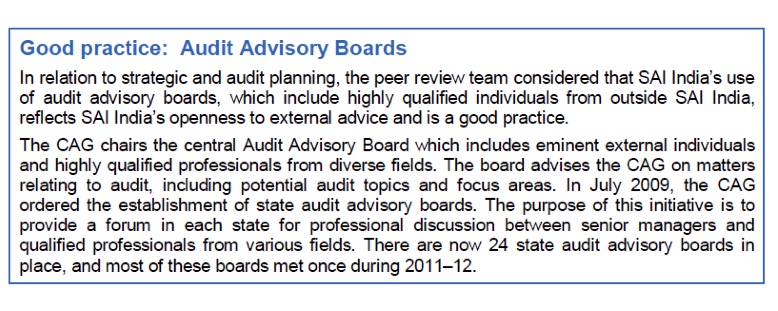The Audit Advisory Board (AAB) has not been reconstituted under the chairmanship of newly appointed Comptroller and Auditor General (CAG) of India, Shri Rajiv Mehrishi, who took over the office on September 25th, 2017.
It has now been close to nine months and for the past some time CAG of India website carries just a one-liner promising that “The Audit Advisory Board is being reconstituted.”
An Audit Advisory Board provides suggestions on matters relating to audit, including coverage, scope and prioritization of audits together with suggestions regarding audit approaches and techniques within the framework of the constitutional and statutory mandate of the Comptroller & Auditor General of India. AAB is one of the key instruments employed to enhance leadership and direction in Indian Accounts and Audit Department.
The practice of constituting Audit Advisory Board had started in March 1999 during the tenure of V. K. Shunglu as CAG of India. This institutional mechanism was created with a view to “provide C&AG with inputs for audit planning and for setting overall audit objectives”. The board usually consists of eminent persons in diverse fields, Deputy CAGs and Additional Deputy CAGs from the IAAD. The members of the board functions in an honorary capacity.
Since 1999, AAB has been reconstituted eight times (in 2001, 2003, 2006, 2009, 2011, 2013 and 2015). The term of the eighth Board came to an end on September 2, 2017. The performance reports of CAG of India has talked about the practice of constituting the Audit Advisory Board as “a reflection of our openness to external advice”. This practice has also been identified as a good practice by the International Peer Review Team. While one doesn’t wish to raise any issue with the prerogative of the CAG of India to invite well-known individuals from different walks of life and constitute AAB, what one would like to demand from an apex institution who is constitutionally obligated to discharge the function of public auditing is to be transparent and forthcoming about the way Audit Advisory Boards have been constituted and functioned so far.
While one doesn’t wish to raise any issue with the prerogative of the CAG of India to invite well-known individuals from different walks of life and constitute AAB, what one would like to demand from an apex institution who is constitutionally obligated to discharge the function of public auditing is to be transparent and forthcoming about the way Audit Advisory Boards have been constituted and functioned so far.
For an audit advisory board to earn the highest regard of citizens, it is incumbent upon the person constituting it to ensure that there is not even one person on the board who is representing some interest group. Yes, shouldn’t our eyebrows be raised when one notices a secretary of an organization that represents business interests?
While it is a welcome step to see academicians and activists – whose selection to the board doesn’t flow from their being elected on a position of federations and associations – what one would like to ask for is some prior concerns shown by these individuals on the functioning and powers of the CAG of India office. It is not very far back from the present time that we were witness to ruling regime denigrating this constitutional institution and sitting idly on the proposal to amend the CAG (Duties, Powers and Conditions of Services) Act, 1971.
*The Author is an Assistant Professor at the Azim Premji University, Bangalore
